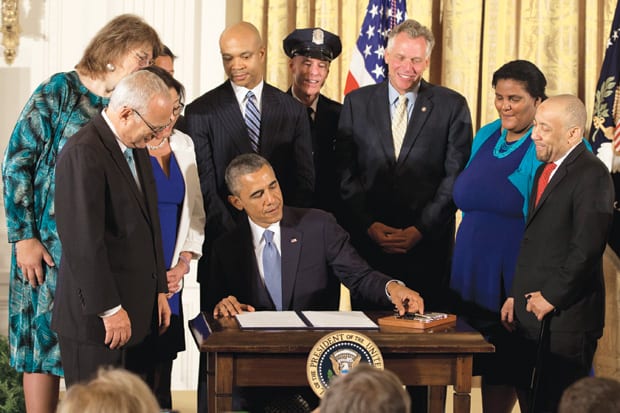Obama’s executive orders protecting LGBT employees offer some protections, but more are needed

SIGNING FOR EQUALITY | Surrounded by LGBT supporters, including Virginia Gov. Terry McAuliffe, third from right, President Barack Obama signs executive orders to protect LGBT employees from federal workplace discrimination on Monday, July 21. The executive orders prohibit discrimination against gay and transgender workers in the federal government and its contracting agencies, without a new exemption that was requested by some religious organizations. (AP Photo/Jacquelyn Martin)
President Barack Obama signed two executive orders Monday, July 21, barring companies with federal contracts from discriminating against LGBT employees. The move drew praise from a wide variety of local and national leaders and put a large local federal contractor under fire.
Rep. Marc Veasey, D-Fort Worth, a member of the Congressional LGBT Equality Caucus, said he welcomes the president’s action. But he also chastised Congress for failing to vote on the Employment Non-Discrimination Act, of which he is an original co-sponsor.
“President Obama’s executive order is a major step forward in ensuring LGBT employees have the same protections against discrimination and harassment that their colleagues already enjoy. It is time for House leadership to bring ENDA up for a vote to extend protections to all workers around the country,” Veasey said. “We must ensure that all Americans are judged based on the quality of their work, not who they are or who[m] they love.”
Texas is the largest beneficiary of federal contracts in the country, according to the Office of Management and Budget’s USAspending.gov website. Since 2000, according to the website, Texas contractors have received nearly 2 million contracts totaling $545 billion in awards — and those numbers are constantly growing.
The change will also have an impact on one of the country’s largest federal contractors, Irving-based ExxonMobil. The company is one of the few Fortune 500 companies and the only one in the top 10 to not explicitly prohibit termination of employees based on sexual orientation or gender identity.
When Exxon and Mobil merged in 1999, Exxon rescinded a Mobil policy giving employees with same-sex partners domestic partner benefits. And shareholders have voted down proposals to add protections for LGBT people to the merged company’s official policy for 15 straight years, most recently in May.
When contacted by the Associated Press, however, company spokesman Alan Jeffers said on July 22 that the company plans to “abide by the law,” and stressing that the company prohibits “discrimination on any basis.”
He did not, however, address whether or not the company will formally adopt a policy specifically barring discrimination based on sexual orientation or gender identity.
Human Right Campaign Vice President for Communications Fred Sainz disagreed, calling Jeffers’ statement a bold-faced lie.
“ExxonMobil’s Equal Employment and Opportunity Policy has clearly and consistently omitted enumerated LGBT non-discrimination protections for its personnel,” he said.
“Until a nondiscrimination policy is enumerated, it isn’t worth the paper it’s printed on.”
In its annual Corporate Equality Index, which ranks companies based on their commitment to their LGBT employees. HRC gave ExxonMobil its first ever-negative rating.
According to its 2014 report, 91 percent of all Fortune 500 companies have non-discrimination policies barring discrimination based on sexual orientation while 61 percent also bar on the basis of gender identity. Of the 52 Texas-based companies on the list, ExxonMobil and Fluor, Inc., also based in Irving, do not have any policies protecting LGBT employees. Among area employers, however, Fort Worth-based AMR Corporation (the parent company of American Airlines), GameStop Co. in Grapevine, AT&T in Dallas and Nokia in Irving received 100 percent scores on the index.
Daniel Williams, field organizer for Equality Texas, said Obama’s executive orders are “still new protections,” but emphasized that advocates shouldn’t stop efforts in Texas and elsewhere to pass ordinances barring discrimination based on sexual orientation and gender identity.
In Texas, one of 17 states without explicit non-discrimination laws, filing a discrimination lawsuit is difficult, expensive and time-consuming. While some cities, such as Dallas and Fort Worth, have their own protections, others do not. A complainant in one municipality without protections may have to pursue one legal route while a complainant against another would have to pursue other options, he said.
This article appeared in the Dallas Voice print edition July 25, 2014.

